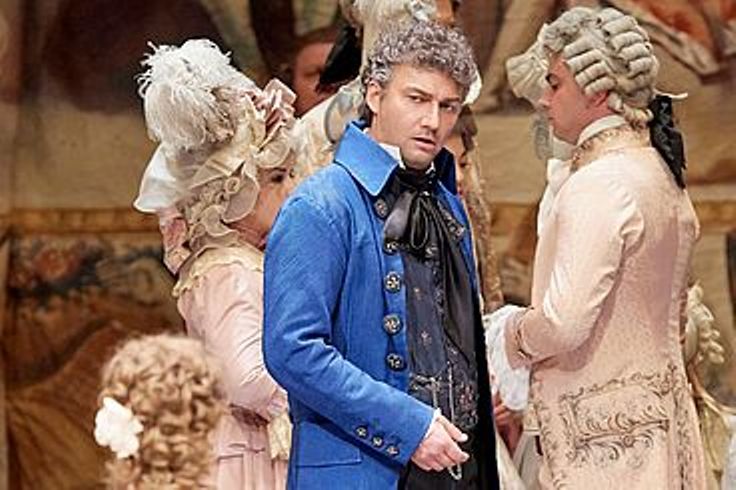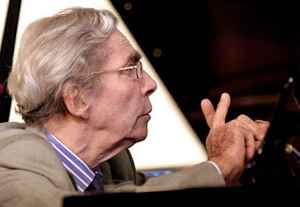Vienna first night: Jonas bored, conductor booed
UncategorizedThe Vienna State Opera opened a revival of André Chenier last night with Jonas Kaufmann as the main draw. Larry L. Lash review it, exclusively for Slipped Disc.
By Larry L. Lash
01 December 2022
VIENNA — Wiener Staatsoper put on Andrea Chénier last night: overall a bad, sad evening despite the ticket-selling presence of Jonas Kaufmann.
The first to blame: Umberto Giordano. „Andrea Chénier“ needs all the help it can get, and last night it got none. What a cheesy, one-tune, shabby little shocker it can be! And the tune ain’t that great.
It is likely the worst I have seen from Otto Schenk (oh! wait! the Met „Ring“!). His name has been removed so it is credited as „Nach einer Inszenierung von …“ („After a production by …”). No one takes credit. Dating to 1981, it consists of a totally bare stage, a few painted bedsheets, and some chairs which come and go. There is no staging outside of basic blocking: chorus on, chorus off; everyone left to him/herself.
Maria Agresta, debuting as Maddalena, sounded interesting in some live radio broadcasts (don’t ask me of what or from where). The voice last night was one-dimensional (loud), not very pleasant, with a tendency to sing under pitch and ahead of the beat. She even omitted the phrase leading to the high note in „La mamma morta“ and just lunged toward a scream which landed south of what is asked by the score.
As Carlo Gérard, George Petean gave the most complete performance. He has an oddly endearing stage presence, knows how to work a house when he has no staging except to stand, face front and sing, but … but … but that break at the passaggio. He clearly knows about it as you could hear him working to mask it (sometimes successfully), but the power of the voice diminishes and there is a slightly more-muted tonal quality (the voice itself is basically mellow; not cutting). „Nemico della patria“ showed the most professional, solid singing in the whole show.
Jonas K’s proud poet clearly wanted something/someone to work with and found himself quite literally alone. It impacted his entire performance. He sang carelessly, kept playing with dimuendi, pianissimi and head voice, and just looked – and sounded – outright bored. He faced front, tried to find something to do (which there wasn’t) so he was reduced to some limited arm-waving. His wasn’t a bad performance per se, but it was far below the level I have come to expect from him.
The audience – outside of Jonas’s usual adulators – wasn’t having a good time, either. There was a total of two sets of curtain calls while everyone was running up the aisles (very rare for a Jonas show).
When Francesco Lanzillotta, who previously conducted only three „I puritani“ in the house in 2019, stepped out for his solo call, booing began. I was startled to think anyone else found as much fault/blame coming from the pit, but there were a lot of people booing and I joined in, spontaneously shattering a self-imposed rule which stood for more than 20 years.
The guy seemingly doesn’t know the score, or how to communicate with his singers. The chorus sang on several different beats and was totally blown apart when an offstage band entered at a distinctly different tempo. Agresta was constantly tugging at him to get things moving, so she sang consistently ahead of the beat, trying to egg him on, but got no help. Overall, the orchestra was obscenely loud, covering everyone in solo passages and ensembles. Jonas gritted his teeth and soldiered on, testing his ability to communicate with a conductor, and found that he simply could not; he just gave up and did what he had to do to get paid and go home.
The company, too, needs to evaluate the need for two intervals, one after Act I and another after Act II. All that need be done onstage is to remove the sheets from the contessa’s drawing room, take out the fancy chairs and bring on the pile of wooden chairs. That’s it. Could be done in 90 seconds. But no: a needless 30-minute pause, a 25-minute act, and then another 30-minute pause. There is no reason on this planet why a performance of „Andrea Chénier“ should last 180 minutes.
I was shocked to see my entire row in the uppermost Galerie empty out as soon as the curtains closed: it was composed entirely of kleine alte Damen who cackled bravi at Jonas at every opportunity.
Bizarre footnotes:
When Agresta got to the passage in „La mamma morta“ in which she describes the fire which killed her mother, a woman began screaming offstage, like an untamed Klytämnestra being murdered by Orest. I thought it might be an errant climate activist, and the house gasped as one, but Agresta kept going and the moment passed without explanation. Was this part of some forgotten concept by Schenk which remains in the prompt book?
Leaving the house on the von Karajan-Platz side, I almost stumbled across a sad, tiny shrine (candles, some supermarket flowers, a handmade sign) dedicated to opera and wannabe rock star Peter Hoffmann on the anniversary of his death 12 years ago. It was left on the steps of the opera house, so it was impossible to ignore. I hope no one’s coat caught on fire.
Next up: can Marin Alsop redeem John Adams’ „Fearful Symmetries“ on Sunday (one of his symphonies which he refuses to call a symphony; there are a lot of them and they are egregiously underplayed, especially „El Dorado“ and „Naïve and Sentimental Music“, as well as „The Dharma at Big Sur“ which is actually a concerto for electric violin)? Last I heard from her she enlightened a Henze orchestral rarity followed by one of the worst Mahler V.’s I’ve ever fretted through. Bless the RSO-Wien: they do their best.
Andrea Chénier plays through 09 December; all performances are sold-out. For those of you with morbid curiosities, it will be livestreamed on ORF’s Ö1 radio station on Saturday (19:00 CET) and archived for a week.
Press photo Michael Pohn/WSO






Comments